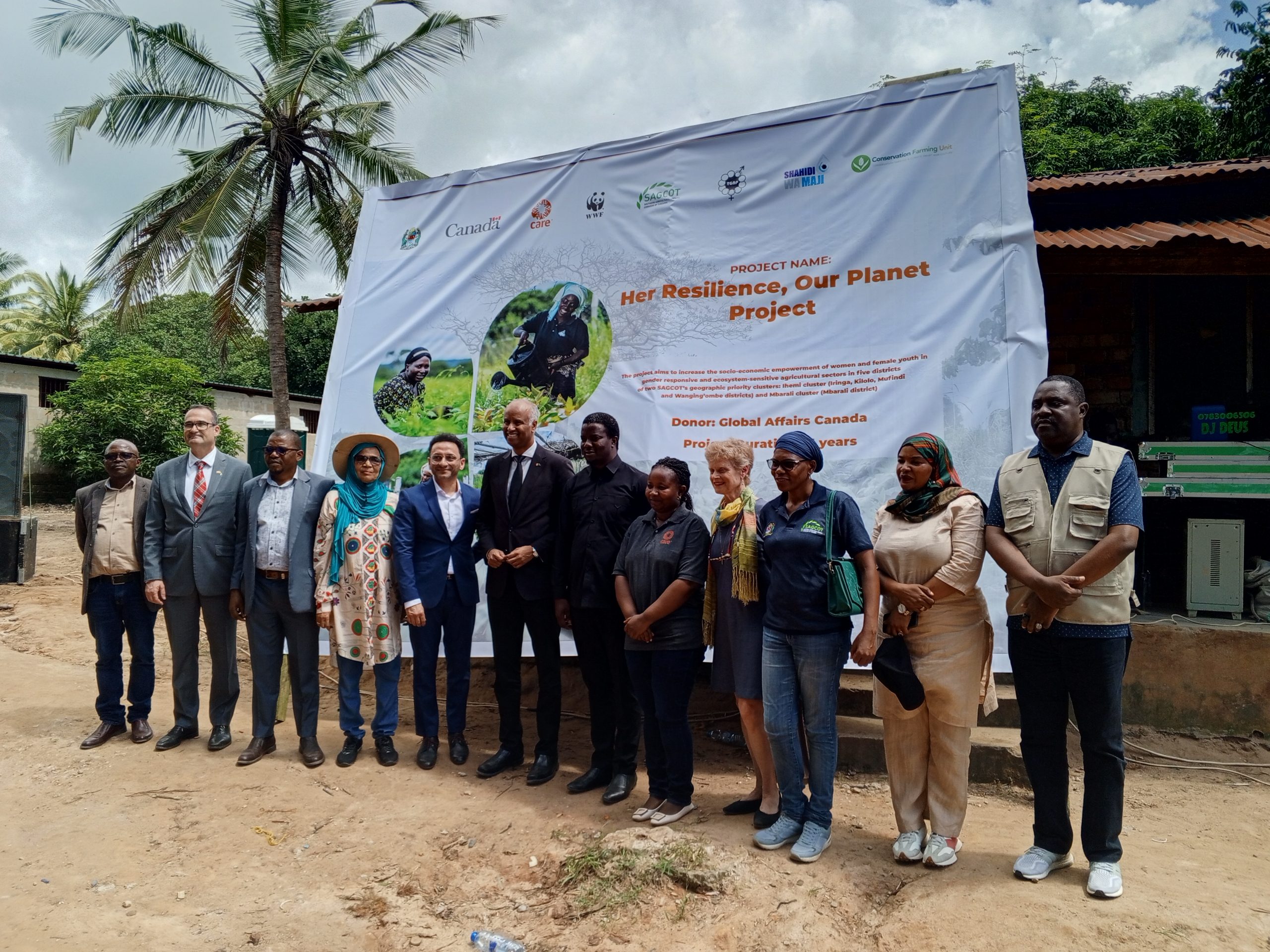Kilimokwanza.org Reporter
The “Her Resilience, Our Planet Project” has been initiated to empower women and young females in the agricultural sector and advance gender equality, agricultural development, and environmental sustainability.
Global Affairs Canada funds this ambitious initiative, which will span six years and target five districts within two of SAGCOT’s geographic priority clusters: the Ihemi cluster (Iringa, Kilolo, Mufindi, and Wanging’ombe districts) and the Mbarali cluster (Mbarali district).
The project’s core objective is to enhance women’s socio-economic status by integrating gender-responsive and ecosystem-sensitive practices into agricultural sectors. It seeks to foster economic independence and improve resilience against climate change impacts.
Project Highlights:
- Donor: Global Affairs Canada
- Duration: 6 years
- Objective: Empower women through sustainable agricultural practices
The initiative involves several key partners, including the Government of Tanzania, CARE, WWF, SAGCOT, TGNP, Shahidi wa Maji, and the Conservation Farming Unit. These organizations combine expertise and resources to ensure the project’s success and sustainability.
The “Her Resilience, Our Planet Project” will promote sustainable farming methods that are economically viable and environmentally friendly. It will provide training and resources to women farmers, enabling them to adopt practices that enhance productivity while preserving natural ecosystems.
The Southern Agricultural Growth Corridor of Tanzania (SAGCOT), witnessed the launch of a transformative six-year initiative on May 15, 2024, under the sprawling branches of mango trees at Koga Farm, Mkuranga District.
The Honourable Ahmed Hussen, Canada’s Minister of International Development, and a cadre of Tanzanian officials unveiled an ambitious TZS 38 billion project to uplift youth and women through sustainable farming.
This initiative, funded by the Government of Canada through CARE International Canada with approximately CAD 20 million, reflects a profound partnership to tackle some of the most pressing challenges faced by this vibrant East African nation, including climate change, economic disenfranchisement, and agricultural sustainability.
The Promise of Sustainable Development:
During the event, Minister Hussen highlighted the critical intersection of sustainable agriculture and climate action. “Through this project, Canada is collaborating with Tanzania to promote an accountable response to climate change by focusing on three key areas: climate change adaptation, climate mitigation, and the transition to renewable energy,” Minister Hussen emphasized. He pointed to Koga Farm’s mango cultivation as a beacon of what sustainable agricultural practices can achieve in crop resilience and income generation and in providing export opportunities to markets like Canada.
Empowering Local Communities:
Echoing the spirit of international cooperation, Hon. David Silinde, Tanzania’s Deputy Minister of Agriculture, expressed profound gratitude towards the Canadian government. He shared insights into the role of agriculture as Tanzania’s economic backbone, supporting over 80% of the populace, but noted that climate change had significantly impacted agricultural productivity. The project, he assured, would have a deep focus on empowering over 175,000 farmers, particularly youth and women, with innovative technologies and sustainable practices to combat climate adversities effectively.
The Hon. Abubakar Kunenge, the Coastal Regional Commissioner, also highlighted the regional perspective and reiterated the government’s commitment to advancing agriculture as a national priority.
Cultivating Economic and Environmental Resilience:
Madam Fatma Riyami, Chair of The Association of Mango Growers (AMAGRO) and Managing Director of NatureRipe Kilimanjaro underscored the vast potential of mango farming. With a global market scaling to USD 67.95 billion by next year and Tanzania’s ranking as a top mango producer, she pointed out the immense opportunities in optimizing the cultivation calendar to tap into off-season demands internationally. Madam Fatma further explained how sustainable practices at farms like Koga contribute economically and play a crucial role in carbon sequestration, a vital element in the fight against climate change.
Replication and Expansion:
Ms. Tula Mloge, Principal Assistant to the CEO of SAGCOT, lauded the initiative for enhancing agricultural resilience by emphasizing climate adaptation strategies. With the endorsement of President Dr. Samia Suluhu Hassan, such success models are planned to be replicated across other agricultural regions of Tanzania, promising a more inclusive and sustainable future.
Her Resilience, Our Planet Project:
An integral part of this initiative is the “Her Resilience, Our Planet Project,” which specifically targets the socio-economic empowerment of women and female youth through gender-responsive and ecosystem-sensitive agricultural practices. Spanning five districts within SAGCOT’s priority clusters, the project is poised to make significant educational and economic impacts across a broad swathe of Tanzanian society.
The “Her Resilience, Our Planet Project” targets five districts within SAGCOT’s geographic priority clusters: Ihemi cluster (Iringa, Kilolo, Mufindi, and Wang’ing’ombe districts) and Mbarali cluster (Mbarali district) but provides an opportunity to educate farmers in various regions, including Coast Region, Morogoro, Dodoma, Singida, Shinyanga, Simiyu, Geita, Mwanza, and Kigoma.
With support from CARE and SAGCOT stakeholders, the project seeks to attract increased investment in fruit crop production in these areas, promising benefits for farmers and boosting national income.
